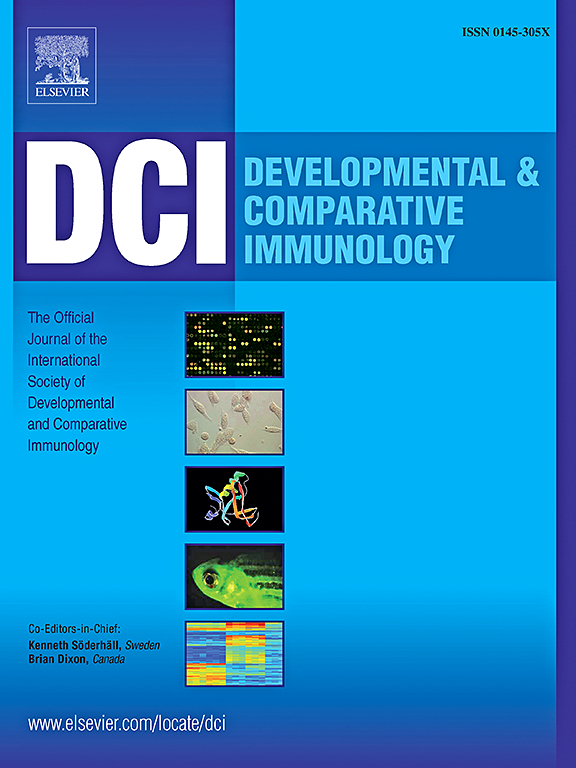Newly developed mRNA vaccines induce immune responses in Litopenaeus vannamei shrimps during primary vaccination
IF 2.7
3区 农林科学
Q1 FISHERIES
引用次数: 0
Abstract
White spot syndrome virus (WSSV) causes highly destructive infection in crustacean aquaculture, often resulting in 100% mortality within a week. However, there is lack of studies addressing the safety issues of WSSV vaccines in shrimps. In this study, WSSV VP28 mRNA vaccines were developed using codon deoptimization approach. These vaccines were administered to Litopenaeus vannamei shrimps at various dosages to access their safety and the shrimps’ immune responses using quantification PCR (qPCR). The findings of this study indicate that the expression level of codon deoptimized VP28 mRNA vaccines are lower compared to the wild type VP28 vaccines, as observed through a comparison of bioinformatic predictions and experimental results. Additionally, the total haemocyte count (THC) in shrimps injected with codon deoptimized VP28 vaccine was higher than those injected with wild type VP28 vaccines. Furthermore, the expression of immune-related genes differed between codon deoptimized and wild type VP28 vaccines. In summary, the results suggest that 0.01 μg codon deoptimized VP28-D1 mRNA vaccine is the most promising WSSV mRNA vaccine, displaying low pathogenicity and expression in shrimps. To the best of our knowledge, this research represents the first attempt to attenuate WSSV using codon deoptimization method and development of a potential mRNA vaccine for shrimp purpose. The study addresses an important gap in shrimp vaccine research, offering potential solutions for WSSV control in shrimps.
新开发的 mRNA 疫苗在初次接种时诱导凡纳滨对虾产生免疫反应
白斑综合征病毒(WSSV)会对甲壳类水产养殖造成极具破坏性的感染,通常会在一周内导致 100% 的死亡。然而,目前还缺乏针对对虾 WSSV 疫苗安全性问题的研究。本研究采用密码子去优化方法开发了 WSSV VP28 mRNA 疫苗。将这些疫苗以不同剂量注射给凡纳滨对虾,使用定量 PCR (qPCR) 检测疫苗的安全性和对虾的免疫反应。研究结果表明,通过比较生物信息学预测和实验结果,经密码子去优化的 VP28 mRNA 疫苗的表达水平低于野生型 VP28 疫苗。此外,注射了经过密码子去优化的 VP28 疫苗的对虾的总血细胞数(THC)高于注射了野生型 VP28 疫苗的对虾。此外,经密码子去优化的 VP28 疫苗和野生型 VP28 疫苗的免疫相关基因的表达也有所不同。总之,研究结果表明,0.01μg 经密码子去优化的 VP28-D1 mRNA 疫苗是最有前途的 WSSV mRNA 疫苗,在对虾中的致病性和表达量都很低。据我们所知,这项研究是首次尝试使用密码子去优化方法对 WSSV 进行减毒,并开发出一种用于对虾的潜在 mRNA 疫苗。该研究填补了对虾疫苗研究的一个重要空白,为对虾WSSV控制提供了潜在的解决方案。
本文章由计算机程序翻译,如有差异,请以英文原文为准。
求助全文
约1分钟内获得全文
求助全文
来源期刊
CiteScore
6.20
自引率
6.90%
发文量
206
审稿时长
49 days
期刊介绍:
Developmental and Comparative Immunology (DCI) is an international journal that publishes articles describing original research in all areas of immunology, including comparative aspects of immunity and the evolution and development of the immune system. Manuscripts describing studies of immune systems in both vertebrates and invertebrates are welcome. All levels of immunological investigations are appropriate: organismal, cellular, biochemical and molecular genetics, extending to such fields as aging of the immune system, interaction between the immune and neuroendocrine system and intestinal immunity.

 求助内容:
求助内容: 应助结果提醒方式:
应助结果提醒方式:


